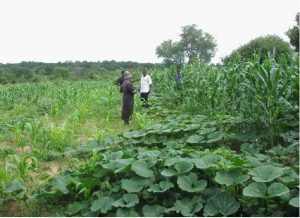
Let me explain why I say I despair…of course, we have to have huge anti-poaching efforts going on out there, but the sad reality is that we are never going to combat it and we are just fighting a losing battle – the rarer the ‘commodities’ become, the higher it drives the market price up and therefore the demand. We also have the poaching for bushmeat trade and, both reasons for the poaching are driven by the exact same thing here in Africa – horrific desertification and dying soils, due to mismanagement of resources, which leads to poverty and desperation.
While we absolutely have to continue anti-poaching efforts, it is essential that we stop ONLY treating the symptoms (the poaching) and urgently start treating the CAUSE (the desertification) before it is too late.
Here is an example of what I’m talking about and how the future of our wildlife depends on the health of our soils and our rural communities.
I have just got involved in a project to holistically manage and regenerate the 450,000 hectares of Hwange Communal Lands. We will be working with the 5 village chiefs of the area who have already been put through training in holistic management at the Africa Centre For Holistic Management. The chief’s have learnt that with a simple change in management to using the holistic framework, how their livestock can go from being a major part of the problem of causing desertification, to being used as a tool to mimic nature and become a very major part of the solution.
Once their management becomes holistic and their livestock start to heal the land, their rivers will become healthier and flow all year round, they will have healthy livestock that has more and more grazing every year as biodiversity returns, their crop yields will increase by up to 400% without ever having to buy fertilizer (crops are planted where the over-night mobile livestock kraal has been) where the soil is aerated with their hooves (no need for tillage) and already fertilized with their dung and urine and all the life-supporting micro-organisms that have to pass through the animals stomachs.
This would also address human/wildlife conflict because they will be supplied with the tried and tested lion-proof kraals to protect their livestock at night. During the day, with the livestock all together in one huge herd (instead of randomly scattered all over the place, as they all are now) they will be much safer from predators too. And they will be supplied with the wonderful ‘elephant-proof’ bee fences, which go around their crop fields and prevent elephants and other crop-raiding animals from causing damage. Once there is better and better grazing, the wildlife will have plenty of food, which will also make them lose interest in the crops.
We then have a plan to create a land-to-market project for the villagers, where they can sell their meat (which is completely healthy and purely grass-fed) and chemical free vegetables and honey to the hotels and lodges around Hwange and Victoria Falls. The guests can be taught how the food they are eating is not only completely chemical free and healthy, the animals are also raised happy and not cooped up in horrible pens or factory farmed, and the best part, they are regenerating habitat for wildlife. This would lead to responsible and regenerative tourism.
It’s just a win-win all around. Please get behind projects like this if you truly want to put an end to poaching and safe our wonderful wildlife in the long run.
THIS is what will combat poaching for good – no villager is going to risk death or a massive jail sentence to poach an animal when they have healthy land and healthy families. And there would be no more bush meat trade if everyone had healthy land, food all year round and an income from it.
For those of you interested in learning more about what holistic management is, and want to see the results, here are a couple of links: https://www.facebook.com/
https://www.facebook.com/


